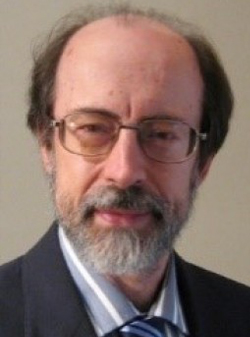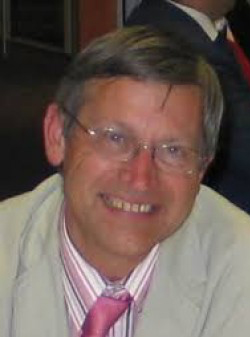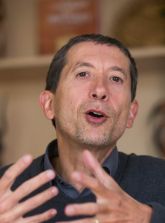Legal Organs
Scientific Committees
The Presidium of the European Academy of Sciences (EurASc) is the highest strategic and governance body of the Academy. It is composed of distinguished Fellows elected by their peers, and is responsible for overseeing the Academy’s statutes, financial affairs, election processes, and overall scientific and organisational direction.
The Presidium provides leadership and vision, ensuring that the Academy remains aligned with its mission to promote excellence in science and technology across Europe and globally. It supervises the activities of the Scientific Divisions, ratifies key decisions regarding membership and awards, and upholds the values of independence, meritocracy, and interdisciplinary collaboration that define EurASc.
The Presidium meets regularly to guide strategic initiatives and to ensure that EurASc responds dynamically to scientific, societal, and technological challenges.
President : March 2018 - October 2028
Professor Rodrigo Martins - Portugal
NEW UNIVERSITY OF LISBON
Prof. Rodrigo Ferrão de Paiva Martins is Full Professor at the Department of Materials Science of the NOVA School of Science and Technology | FCT NOVA, Portugal. He is Director of CEMOP/Uninova (Centre of Excellence in Microelectronics and Optoelectronics Processes), and Director of CENIMAT/i3N (Center for Nanostructures, Nanomodelling and Nanofabrication), internationally renowned for his leadership in the fields of advanced materials, transparent electronics, and functional nanostructures.
Prof. Martins holds prominent positions at the European and global level. He is Chair of the European Committee Affairs of the European Materials Research Society (E-MRS), and Chair of the Global Leadership and Service Award Committee. He served as President of the International Union of Materials Research Societies (IUMRS) and is a Member of the Portuguese Academy of Engineering and of the Portuguese Order of Engineers. He is also Chair of the BMC Materials journal series under Springer Nature.
His pioneering contributions to materials science have earned him numerous national and international recognitions, and he has played a pivotal role in promoting global cooperation in materials research.
Prof. Rodrigo Martins has served in the Presidium of the European Academy of Sciences as follows:
Vice-President: March 2017 – February 2018
President: First mandate from March 2018 – February 2020; Second mandate from March 2020 – February 2022, extended until April 2024 due to the COVID-19 pandemic; Third and final mandate from November 2025 – October 2028.
Vice-President : March 2018 - October 2028
Prof. Alain Tressaud - France
CNRS
Prof. Alain Tressaud is Emeritus Research Director of the French National Centre for Scientific Research (CNRS) in Bordeaux, France. He is a world-renowned expert in solid-state chemistry, fluorine chemistry, and the modification of surface properties of materials. His pioneering work has had a lasting impact on the development of functional materials and fluorinated compounds.
He has authored over 370 scientific papers, 20 book chapters, 12 international patents, and has edited 10 books, including Fluorine: A Paradoxical Element (2019). He is the founding editor of the book series Advances in Fluorine Science and Progress in Fluorine Science (Elsevier), and editor of Progress in Science, Progress in Society (Springer-Nature, 2018), the official proceedings of the 2016 EurASc Ceremony in Brussels.
Prof. Tressaud founded and chaired the French Network on Fluorine Chemistry, supported by CNRS, and is a Member of several scientific academies and societies, including the European Academy of Sciences and Arts (EASA), WSSET (UK), and Distinguished Fellow of the French Chemical Society (SCF). Among his many distinctions are the Atomic Energy Agency Award of the French Academy of Sciences (2008), the Fluorine Award of the American Chemical Society (2011), and the Henri Moissan International Prize (2013).
Prof. Tressaud was awarded the Honor for Distinguished Leadership Award (2024) in recognition of his exemplary service and leadership as former President of the European Academy of Sciences.
Prof. Alain Tressaud has served in the Presidium of the European Academy of Sciences as follows:
President: April 2017 – March 2018
Vice-President: March 2018 – February 2020, extended until April 2024 due to the COVID-19 pandemic (in accordance with the EurASc Bylaws); Second mandate from November 2025 – October 2028.
Member : November 2025 – October 2029
Prof. Armando Pombeiro - Portugal
UNIVERSITY OF LISBON
Armando J. L. Pombeiro is Full Professor Jubilado at Instituto Superior Técnico, Universidade de Lisboa (ULisboa), Full Member of the Academy of Sciences of Lisbon, Corresponding Member of the Brazilian Academy of Sciences, and Fellow of the European Academy of Sciences (EurASc) and of Academia Europaea. He has held several leading roles, including President of the Scientific Council of the Academy of Sciences of Lisbon, founding President of the College of Chemistry of ULisboa, former Coordinator of the Centro de Química Estrutural and of its Synthesis and Catalysis line, and co-founder of the Portuguese Electrochemical Society and of the Iberoamerican Society of Electrochemistry. He has chaired many major international conferences, including the EurASc Symposium 2024 on Science for Sustainability, and is editing the EurASc 20th anniversary celebratory book on this topic.
His research focuses on the activation of small molecules of industrial, environmental, or biological significance, including catalysis under mild and sustainable conditions (such as alkane functionalisation, oxidation of volatile organic compounds, carbon–carbon couplings, carbon dioxide utilisation, water in catalysis, water splitting and oxygen reduction reactions), polynuclear and supramolecular structures (including metal–organic frameworks), non-covalent interactions in synthesis, bioactive and chemosensor coordination compounds, molecular electrochemistry, and theoretical studies. He has authored or edited 15 books and co-authored over 1,000 research publications (including around 190 reviews and book chapters) and about 40 patents. His record includes 923 indexed publications, around 33,000 total citations and an h-index of 81 (Web of Science, January 2025).
Prof. Armando Pombeiro has received numerous distinctions, including Honorary or Chair Professorships at St. Petersburg State University and National Taiwan University of Science and Technology, the inaugural SCF French–Portuguese Prize of the French Chemical Society, the Madinabeitia–Lourenço Prize of the Spanish Royal Chemical Society, the Vanadis Award, and several scientific prizes from Portuguese institutions. In his honour, special issues of Coordination Chemistry Reviews and the Journal of Organometallic Chemistry were published, and a dedicated symposium was held.
Prof. Armando Pombeiro was elected as a member of the Chemistry Division Scientific Committee for a first mandate, serving from May 2025 to April 2028.
He was also elected as a Member of the Presidium, with a mandate running from November 2025 to October 2029.
Member : November 2025 – October 2029
Prof. Evamarie Hey-Hawkins - Germany
UNIVERSITAT LEIPZIG
Evamarie Hey-Hawkins was Professor of Inorganic Chemistry at Leipzig University from 1993 to 2023 and, following her retirement, joined the Institute of Bioanalytical Chemistry (BBZ). She obtained her diploma (1982) and doctoral degree (1983) at the University of Marburg and held research positions in the UK and Australia before completing her habilitation in 1988. Her career includes work at the Max Planck Institute for Solid State Research and long-standing contributions to inorganic and organophosphorus chemistry.
She has received numerous distinctions, including the IUPAC “Distinguished Woman in Chemistry and Chemical Engineering” Award (2013), several honorary doctorates (2014, 2016, 2025), the Order of Merit of the Free State of Saxony (2017), the Leipzig University Medal (2018), the Leipzig Science Award (2019), and the Karl-Ziegler Prize (2021). She is a member of EurASc, EASA and Academia Europaea and has served extensively on scientific advisory boards, editorial boards and international research committees.
Her scientific interests span organophosphorus chemistry, bioactive boron compounds, heterometallic complexes and catalysis, and more than 100 doctoral students have completed their theses under her supervision. She has authored over 600 peer-reviewed publications and currently serves as head of the IUPAC/German Central Committee for Chemistry, Vice President of the German Society on Boron Neutron Capture Therapy and project leader at Babeș-Bolyai University.
Prof. Evamarie Hey-Hawkins was elected as a Member of the EurASc Presidium, with a mandate from November 2025 to October 2029.
Member : March 2015 - October 2029
Prof. Natividad Carpintero-Santamaria - Spain
UNIVERSIDAD POLITÉCNICA DE MADRID (UPM)
Prof. Natividad Carpintero-Santamaría is Full Professor at the Department of Energy Engineering of the Polytechnic University of Madrid (UPM) and serves as General Secretary of the Institute of Nuclear Fusion (UPM). She has lectured widely across the globe, including in Armenia, Australia, the European Union, Jordan, Latin America, the Russian Federation, Turkey, and the United States.
Her academic work spans nuclear fusion, energy systems, and the history and ethics of science and technology. She is the author of The Atom Bomb: The Human Factor during Second World War (Díaz de Santos, 2007) and co-editor, with Guillermo Velarde, of Inertial Confinement Nuclear Fusion: A Historical Approach by its Pioneers (Foxwell & Davies, 2007), a title recommended by the EUROfusion Consortium of the European Commission. She has also published chapters and papers with Springer, Routledge, Cambridge Scholars, and Elsevier.
Prof. Carpintero-Santamaría is a member of the Commission for Energy and Security and Defence of the Centre for National Defence Studies (CESEDEN) and sits on the General Council of EuroDefense-Spain. Her career has been recognised with several national honours, including the Alfonso XIII Prize in History of Applied Science (Spanish Academy of Sciences, 1991), the Cross of Aeronautical Merit (White Distinction) (2011), and the Cross of Military Merit (White Distinction) (2015).
Prof. Natividad Carpintero-Santamaría has served as Member of the Presidium of the European Academy of Sciences from: March 2015 – February 2019; March 2019 – February 2023, extended until April 2024 due to the COVID-19 pandemic (in accordance with the EurASc Bylaws); Third and final mandate from November 2025 – October 2029.
In addition to her role in the Presidium, Prof. Carpintero-Santamaría was also elected as a Member of the Executive Committee, reflecting her longstanding leadership and service within the Academy.
Member : March 2015 - October 2028
Prof. Richard Durst - United States of America
CORNELL UNIVERSITY
Prof. Richard A. Durst is Professor Emeritus of Chemistry at Cornell University, USA. He received his B.S. in Chemistry with highest honours from the University of Rhode Island in 1960 and earned his Ph.D. in Analytical Chemistry, with a minor in biophysics, from the Massachusetts Institute of Technology (MIT) in 1963.
He began his distinguished career at the U.S. National Bureau of Standards (NBS, now NIST) in 1966, where he served as Chief of the Electrochemical Analysis Section and later as Deputy Director of the Center for Analytical Chemistry. His federal service was recognised with both the Bronze and Silver Medals for Superior and Meritorious Federal Service, and in 2009 he was inducted into the NBS/NIST Portrait Gallery of Distinguished Scientists.
In 1990, he joined the faculty at Cornell University, where he continued his prolific academic work. He is the author or co-author of over 260 technical articles and book chapters, and has edited two major scientific volumes. His contributions to analytical chemistry, especially in electrochemistry and biosensing, are widely recognised internationally.
Prof. Durst was elected Fellow of the International Union of Pure and Applied Chemistry (IUPAC) and Fellow of the European Academy of Sciences (EurASc) in 2002.
Prof. Richard A. Durst has served as Member of the Presidium of the European Academy of Sciences from: March 2015 – February 2019; March 2019 – February 2023, extended until April 2024 due to the COVID-19 pandemic (in accordance with the EurASc Bylaws), and final mandate from November 2025 – October 2029.
In addition to his role in the Presidium, Prof. Durst was also elected as a Member of the Executive Committee, reflecting his longstanding leadership and service within the Academy.
Member : November 2025 - October 2028
Prof. Paul Lecoq
CERN
Prof. Paul Lecoq has spent his entire scientific career at CERN. He received his diploma in Physics Instrumentation Engineering from the École Polytechnique de Grenoble in 1972, under the supervision of Nobel Laureate Louis Néel, and earned his PhD in Nuclear Physics from the University of Montreal (Canada) in 1974. He subsequently joined CERN, where he participated in five major international particle physics experiments, including one led by Nobel Laureate Samuel Ting.
Prof. Lecoq was responsible for the construction of the scintillator-based electromagnetic calorimeter of the CMS experiment, a key component in the discovery of the Higgs boson. In 1990, he initiated the creation of the Crystal Clear international and multidisciplinary collaboration, hosted by CERN, as well as the SCINT conference series, dedicated to advancing new inorganic scintillators for both scientific and industrial applications.
Prof. Lecoq has served as Head of the Physics Division of the European Academy of Sciences since March 2017:
First mandate: March 2017 – March 2020; Second mandate: March 2020 – March 2023 (extended to March 2024 due to the COVID-19 pandemic); Third and final mandate: May 1st, 2025 – April 30th, 2028, following his re-election during the 2025 Divisions By-Elections.
In addition, Prof. Lecoq was elected as a Member of the EurASc Presidium, with a mandate running from November 2025 to October 2029.
General Secretary : March 2025 - February 2027
Prof. François Pichault - Belgium
UNIVERSITY OF LIÈGE
Prof. François Pichault is a full professor at HEC Liège, University of Liège (Belgium), where he holds a Ph.D. in Sociology. He serves as the director of LENTIC, a research and intervention center specializing in the study of human and organizational aspects of change and innovation processes. Additionally, he is an affiliated professor in human resources management at ESCP Europe.
His research focuses on organizational theory and human resource management, with particular emphasis on the evolution and roles of the HR function, the alignment between HRM policies and corporate strategies, new organizational forms and their impact on social dialogue, and the management of change in both public and private organizations.
Prof. Pichault has authored numerous publications on these topics, contributing significantly to the academic discourse in his fields of expertise.
In recognition of his extensive experience and contributions, he has been appointed as the General Secretary of the European Academy of Sciences (EurASc), with his term commencing in March 2025 for an initial period of two years, potentially extendable.








